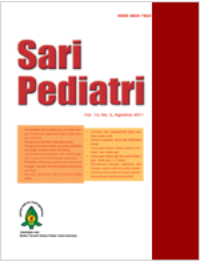Probiotik Pada Gangguan Saluran Cerna Fungsional
Sari
Probiotik memiliki kemampuan untuk memengaruhi komposisi mikroflora saluran cerna. Ketika dikonsumsi dalam jumlah adekuat, probiotik memiliki efek positif terhadap kesehatan pejamu. Terdapat beberapa penelitian yang menilai efek terapeutik probiotik terhadap berbagai macam penyakit, termasuk gangguan saluran cerna fungsional pada anak. Gangguan saluran cerna fungsional adalah gangguan yang dianggap terkait dengan saluran cerna, namun tidak dapat dijelaskan oleh kelainan struktural maupun biokimia. Penelitian besar menggunakan probiotik pada gangguan saluran cerna fungsional telah banyak dilakukan. Penggunaan probiotik juga dianggap aman dan hampir tidak pernah dilaporkan efek samping pada rawat jalan. Beragam strain, dosis, dan metodelogi penelitian menjadikan kesulitan dalam menerjemahkan dan menyimpulkan secara keseluruhan hasil penelitian yang ada. Walaupun demikian, beberapa penelitian dengan metodelogi yang baik memperlihatkan fakta bahwa peran probiotik terhadap beberapa gangguan saluran cerna fungsional tidak dapat diabaikan.
Kata Kunci
Teks Lengkap:
PDFReferensi
Koppen IJN, Nurko S, Saps M, Lorenzo CD, Benninga MA. The pediatric rome IV criteria: what’s new?. Expert Rev Gastroenterol Hepatol 2017;11(3):193-201.
Benninga MA, Nurko S, Faure C, Hyman PE, Roberts ISJ, Schechter NL. Childhood functional gastrointestinal disorders: neonate/toddler. Gastroenterology 2016;150:1443-55.
Hyams JS, Lorenzo CD, Saps M, Shulman RJ, Statiano A, Van Tilburg M. Childhood functional gastrointestinal disorders: child/adolescent. Gastroenterology 2016;150:1456-68.
Johnson CL, Versalovic J. The human microbiome and its potential importance to pediatrics. Pediatrics 2012;129:950-60.
Ibnou-Zekri N, Blum S, Schiffrin EJ, von der Weid T. Divergent patterns of colonization and immune response elicited from two intestinal Lactobacillus strains that display similar properties in vitro. Infect Immun 2003;71:428-36.
Ritchie ML, Romanuk TN. A meta-analysis of probiotic efficacy for gastrointestinal diseases. Plos One 2012;7:e34938.
Huertas-Ceballos AA, Logan S, Bennett C, Macarthur C. Dietary interventions for recurrent abdominal pain (RAP) and irritable bowel syndrome (IBS) in childhood. Cochrane Database Syst Rev 2009;(1):CD003019.
Bausserman M, Michail S. The use of Lactobacillus GG in irritable bowel syndrome in children: a double-blind randomized control trial. J Pediatr 2005;147:197-201.
Francavilla R, Miniello V, Magistà AM, De Canio A, Bucci N, Gagliardi F, Lionetti E, Castellaneta S, Polimeno L, Peccarisi L, Indrio F, Cavallo L. A randomized controlled trial of Lactobacillus GG in children with functional abdominal pain. Pediatrics 2010;126:e1445-152.
Horvath A, Dziechciarz P, Szajewska H. Meta-analysis: Lactobacillus rhamnosus GG for abdominal pain-related functional gastrointestinal disorders in childhood. Aliment Pharmacol Ther 2011;33:1302-10.
Guandalini S, Magazzù G, Chiaro A, La Balestra V, Di Nardo G, Gopalan S, Sibal A, Romano C, Canani RB, Lionetti P, Setty M. VSL#3 improves symptoms in children with irritable bowel syndrome: a multicenter, randomized, placebo-controlled, double-blind, crossover study. J Pediatr Gastroenterol Nutr 2010, 51:24-30.
Giannetti E, Maglione M, Alessandrella A, dkk. A mixture of 3 bifidobacteria decreases abdominal pain and improves the quality of life in children with irritable bowel syndrome: a multicenter, randomized, double-blind, placebo-controlled, crossover trial. J Clin Gastroenterol 2017;51(1):e5-210.
Tabbers MM, de Milliano I, Roseboom MG, Benninga MA. Is Bifidobacterium breve effective in the treatment of childhood constipation? Results from a pilot study. Nutr J 2011;10:19.
Bekkali NL, Bongers ME, Van den Berg MM, Liem O, Benninga MA. The role of a probiotics mixture in the treatment of childhood constipation: a pilot study. Nutr J 2007;6:17.
Bu LN, Chang MH, Ni YH, Chen HL, Cheng CC. Lactobacillus casei rhamnosus Lcr35 in children with chronic constipation. Pediatr Int 2007;49:485-90.
Coccorullo P, Strisciuglio C, Martinelli M, Miele E, Greco L, Staiano A. Lactobacillus reuteri (DSM 17938) in infants with functional chronic constipation: a double-blind, randomized, placebo-controlled study. J Pediatr 2010;157:598-602.
Guerra PV, Lima LN, Souza TC, Mazochi V, Penna FJ, Silva AM, Nicoli JR, Guimarães EV. Pediatric functional constipation treatment with Bifidobacterium-containing yogurt: a crossover, double-blind, controlled trial. World J Gastroenterol 2011;17:3916-21.
Tabbers MM, Chmielewska A, Roseboom MG, Crastes N, Perrin C, Reitsma JB, Norbruis O, Szajewska H, Benninga MA. Fermented milk containing Bifidobacterium lactis DN-173 010 in childhood constipation: a randomized, doubleblind, controlled trial. Pediatrics 2011;127:e1392-99.
Tabbers MM, Boluyt N, Berger MY, Benninga MA. Nonpharmacologic treatments for childhood constipation:systematic review. Pediatrics 2011;128:753-61.
Chmielewska A, Szajewska H. Systematic review of randomised
controlled trials: probiotics for functional constipation. World J Gastroenterol 2010;16:69-75.
Savino F, Pelle E, Palumeri E, Oggero R, Miniero R. Lactobacillus reuteri (American Type Culture Collection Strain 55730) versus simethicone in the treatment of infantile colic: a prospective randomized study. Pediatrics 2007;119:e124-30.
Savino F, Cordisco L, Tarasco V, Palumeri E, Calabrese R, Oggero R, Roos S, Matteuzzi D. Lactobacillus reuteri DSM 17938 in infantile colic: a randomized, double-blind, placebocontrolled trial. Pediatrics 2010;126:e526-33.
Szajewska H, Gyrczuk E, Horvath A. Lactobacillus reuteri DSM 17938 for the management of infantile colic in breastfed infants: a randomized, double-blind, placebo-controlled trial. J Pediatr 2013;162:256-62.
Dupont C, Rivero M, Grillon C, Belaroussi N, Kalindjian A, Marin V. Alpha-lactalbumin-enriched and probioticsupplemented infant formula in infants with colic: growth and gastrointestinal tolerance. Eur J Clin Nutr 2010;64:765-7.
Shanahan F. A commentary on the safety of probiotics. Gastroenterol Clin North Am 2012;41:869-76.
Fedorak RN, Madsen KI. Probiotics and prebiotics in gastrointestinal disorders. Curr Opin Gastroenterol 2004;20:146-55.
Borriello SP, Hammes WP, Holzapfel W, Marteau P, Schrezenmeir
J, Vaara M, Valtonen V. Safety of probiotics that contain Lactobacilli or Bifidobacteria. Clin Infect Dis 2003;36:775-780.
Mackay AD, Taylor MB, Kibbler CC, Hamilton-Miller JM. Lactobacillus endocarditis caused by a probiotics organism. Clin Microbiol Infect 1999;5:290-2.
Rautio M, Jousimies-Somer H, Kauma H, Pietarinen I, Saxelin M, Tynkkynen S, Koskela M. Liver abcess due to a Lactobacillus rhamnosus strain indistinguishable from a L. rhamnosus strain GG. Clin Infect Dis 1999;28:1159-60.
Dai M, Lu J, Wang Y, Liu Z, Yuan Z. In vitro development and transfer of resistance to chlortetracycline in Bacillus subtilis. J Microbiol 2012;50:807-12.
Weichert S, Schroten H, Adam R. The role of prebiotics and probiotics in prevention and treatment of childhood infectious diseases. Pediatr Infect Dis J 2012;31:856-62
DOI: http://dx.doi.org/10.14238/sp20.3.2018.185-9
Refbacks
- Saat ini tidak ada refbacks.
##submission.copyrightStatement##
##submission.license.cc.by-nc-sa4.footer##
Email: editorial [at] saripediatri.org


Sari Pediatri diterbitkan oleh Badan Penerbit Ikatan Dokter Anak Indonesia
Ciptaan disebarluaskan di bawah Lisensi Creative Commons Atribusi-NonKomersial-BerbagiSerupa 4.0 Internasional.




